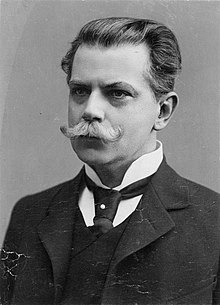Sigurd Ibsen
|
Sigurd Ibsen OB |
|
|---|---|
 |
|
|
In office 1903–1905 Serving with Francis Hagerup (as Prime Minister in Christiania) |
|
| Monarch | Oscar II |
| Preceded by | Ole Anton Qvam |
| Succeeded by | Jørgen Løvland |
| Personal details | |
| Born | December 23, 1859 |
| Died | April 13, 1930 (aged 70) |
| Nationality | Norwegian |
| Political party | Liberal Party of Norway |
| Spouse(s) | Bergliot Bjørnson |
| Children |
Tancred Ibsen Irene Ibsen Bille |
| Parents |
Suzannah Thoresen (mother) Henrik Ibsen (father) |
| Relatives | Joen Bille (grandson) |
Sigurd Ibsen (23 December 1859 – 14 April 1930) was a Norwegian author, lawyer and statesman, who served as (1903–1905) and played a central role in the dissolution of the union between Norway and Sweden in 1905.
Ibsen was born in Christiania, but grew up mostly in Germany and Italy. Being the only child of playwright Henrik Ibsen and his wife Suzannah Thoresen, he struggled all his life to meet his family's high expectations.
Sigurd Ibsen got his doctorate in law in Rome in 1882 and was married to Bjørnstjerne Bjørnson's daughter Bergliot. Their son, Tancred Ibsen, became a well-known film director and their daughter, Irene Ibsen Bille, was married to Josias Bille, a member of the Danish ancient noble Bille family. Irene and Josias's son and Sigurd and Bergliot's grandson was Danish actor Joen Bille.
From 1903 to 1905, he served as (i.e., the leader of the Norwegian delegation to the King of Sweden and Norway and the second highest cabinet position). During his term, George Francis Hagerup was Prime Minister in Christiania. Sigurd Ibsen played a central role in the dissolution of the union between Norway and Sweden in 1905. He is also regarded as important in convincing influential Norwegians supporting a republican government, like Bjørnstjerne Bjørnson, Arne Garborg and Fridtjof Nansen, to turn and instead support a monarchy.
...
Wikipedia
